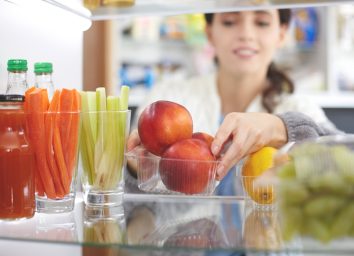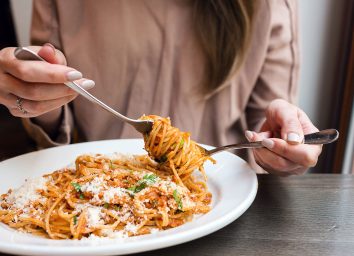What to Eat to Lose Weight and Keep It Off
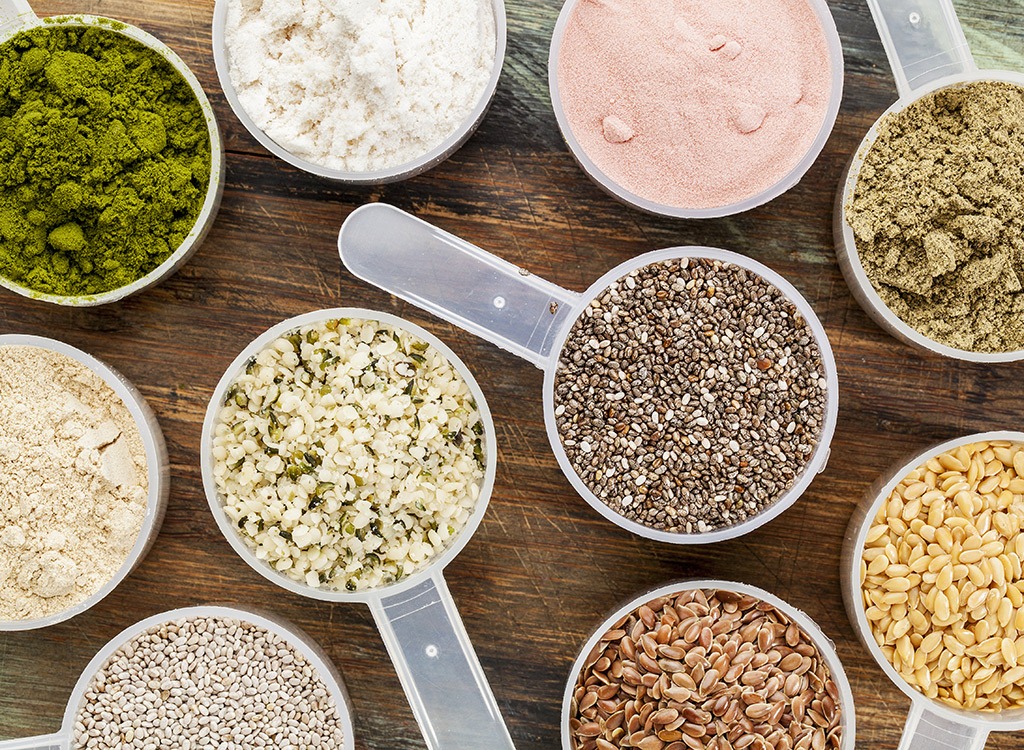
But you don’t have to download every weight loss app in existence and track your every calorie to figure out the formula. Losing weight and staying slim is just a few healthy choices away–for anyone. Most people have to work hard to stay in shape past adolescence, and it all comes down to what you put on your plate. Different things work for different people, but certain foods just do the body good across the board, which is why skinny people always keep these eight foods stocked.
Plain Greek Yogurt
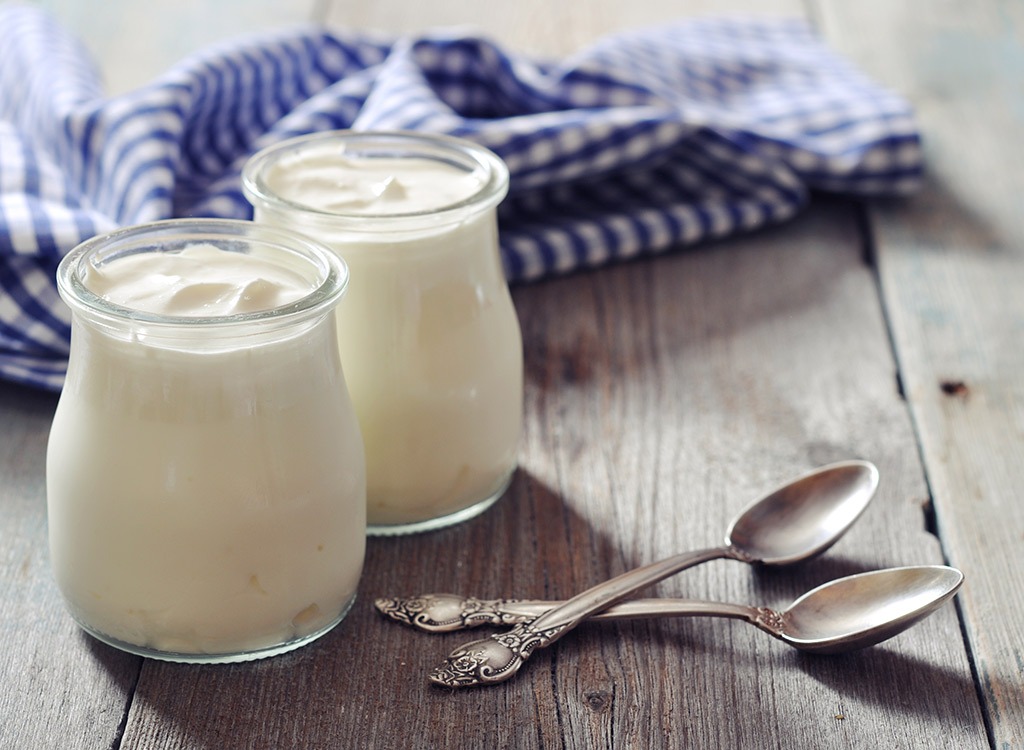
Greek yogurt fanatics have two undeniably strong facts supporting their argument that their favorite eat is a perfect weight loss food: quality Greek-style yogurt is low in calories and boasts an impressively high protein count. A six-ounce serving of plain Greek yogurt contains around 100 calories and nearly 20 grams of protein versus regular low-fat varieties, which average nine grams of protein per six ounces and clock in at 100 calories or more. Don’t settle for a yogurt that skimps on protein; foods higher in the muscle-building nutrient help increase feelings of fullness. If you can’t quite stomach the plain stuff, avoid sugar-laden flavored varieties and add-in your own fruit, honey or nuts.
Almonds
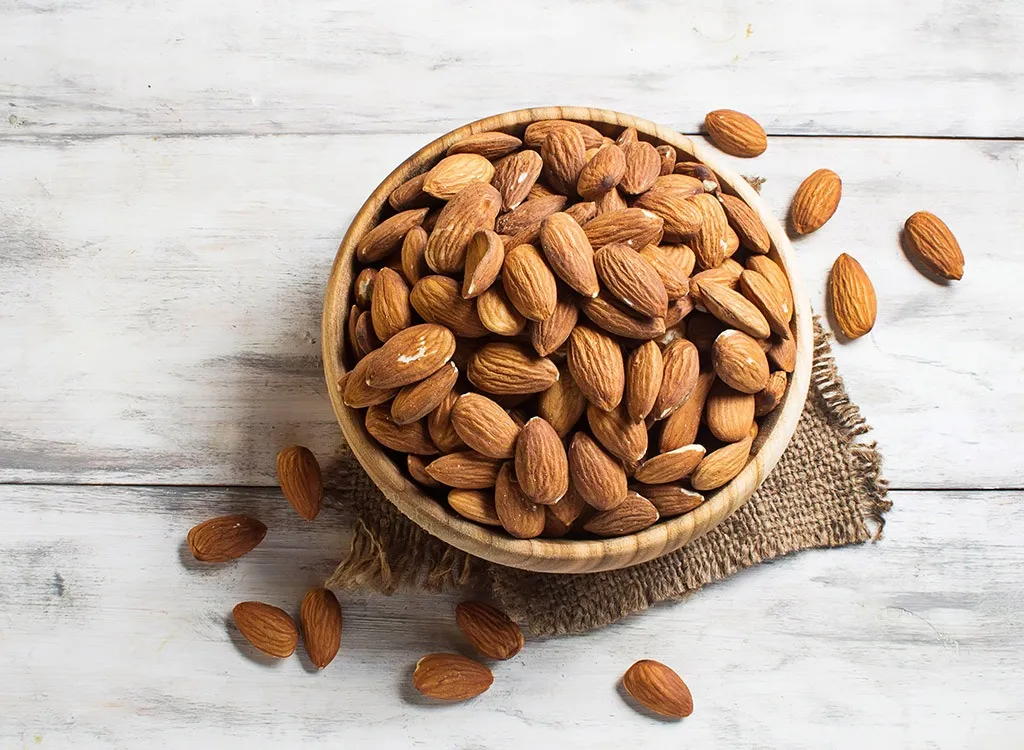
Everyone who’s lost a little weight knows that moderation is the foundation to your success, and calorie-dense nuts are the perfect case in point. Get the portion size right (about one ounce, which is equal to 23 nuts or a small handful) and these little guys are great for weight loss, helping your slim down efforts by curbing appetite and cutting cravings. In fact, dieters who ate a 1.5-ounce serving of almonds as a snack each day experienced less hunger versus those who did not in one European Journal of Clinical Nutrition study. Many stores sell them in pre-portioned 100-calorie packs, taking all the guesswork out of tipping the scale in your favor.
Quinoa
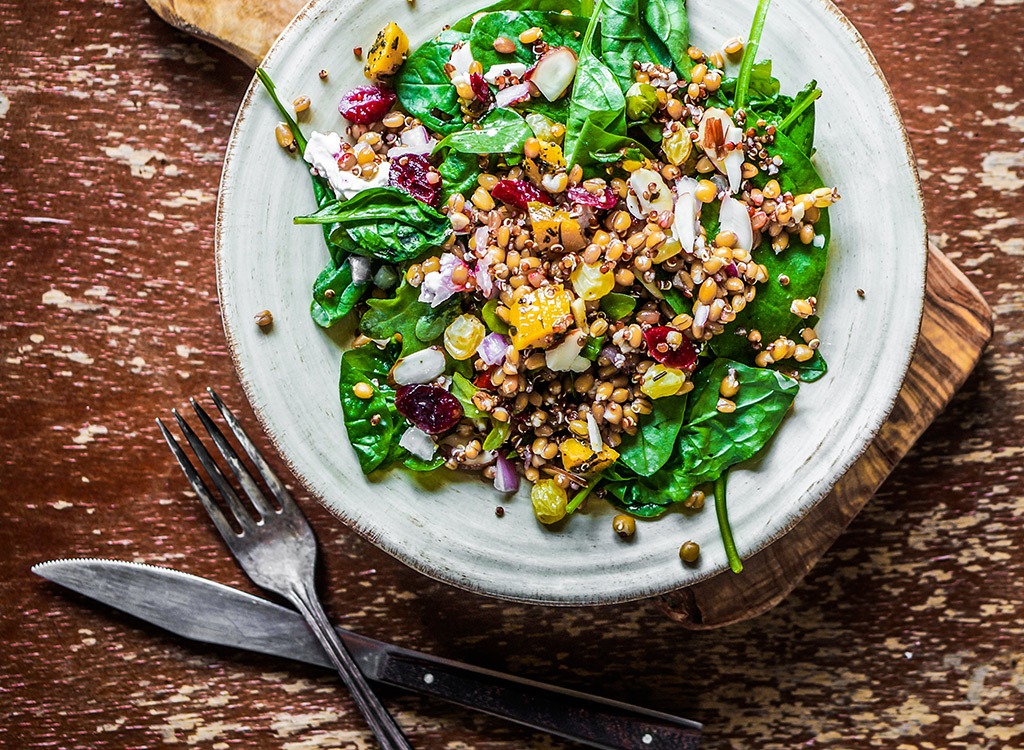
If you’re unfamiliar with this tricky pseudograin and how to cook it, chances are you’re not keen on quinoa. But skinny people love quinoa for it’s versatility–and you will, too. As long as you pre-rinse the grain before cooking it (it has a bitter-tasting coating you’re washing away), quinoa can be added into almost any dish, savory or sweet. It’s also easy to make a giant batch over the weekend and dole out as needed for hectic nights throughout the week. Quinoa is rich in protein and fiber, and is also low on the glycemic index, so it won’t send your blood sugar soaring. These three components are crucial for weight loss because they all keep you feeling fuller, longer and prevent you from grabbing unhealthy, sugary snacks later on.
Spinach
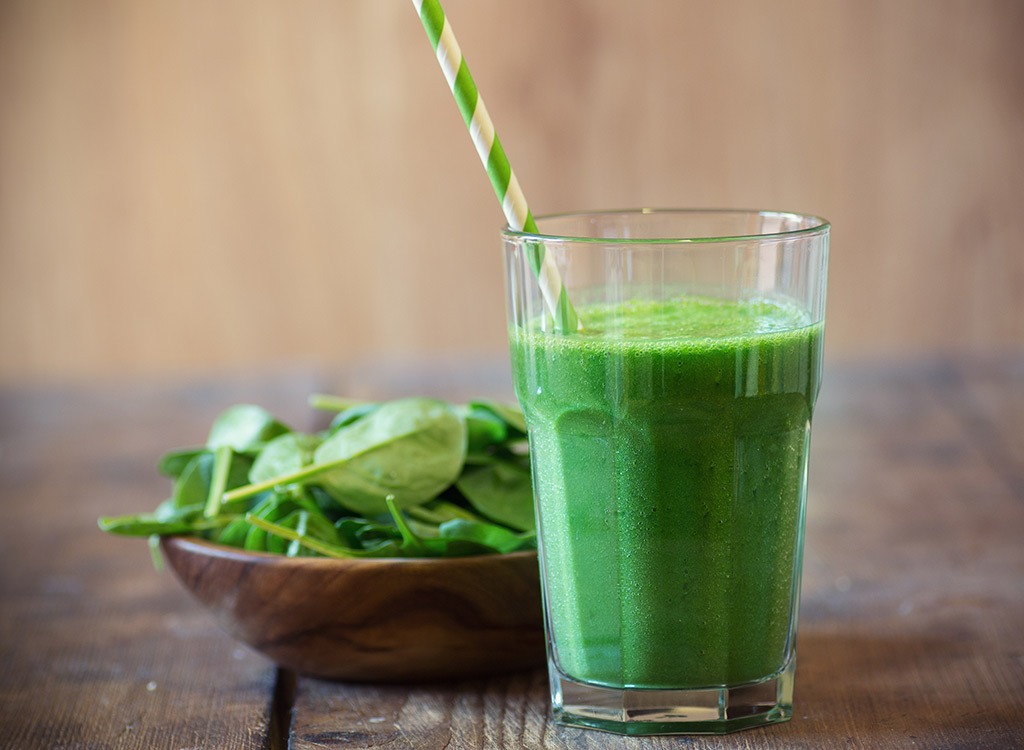
Losing weight is all about getting more from your food (vital nutrients like protein, fiber, vitamins and minerals) for fewer calories–while feeling satisfied, of course. The answer to all those lofty demands you’ll find in one food: spinach. Just one cup of this classic salad green contains seven calories, making it a mainstay in skinny salads, stir-fries and smoothies. But will you actually feel satisfied stocking up on rabbit food? Absolutely. Spinach’s mild flavor allows you to toss a handful into just about any dish, even sweet fruit smoothies, without throwing off the taste you’re going for. Also, recent research from scientists at Lund University in Sweden found that a compound in spinach helps significantly curb cravings and contributes to weight loss efforts.
Eggs
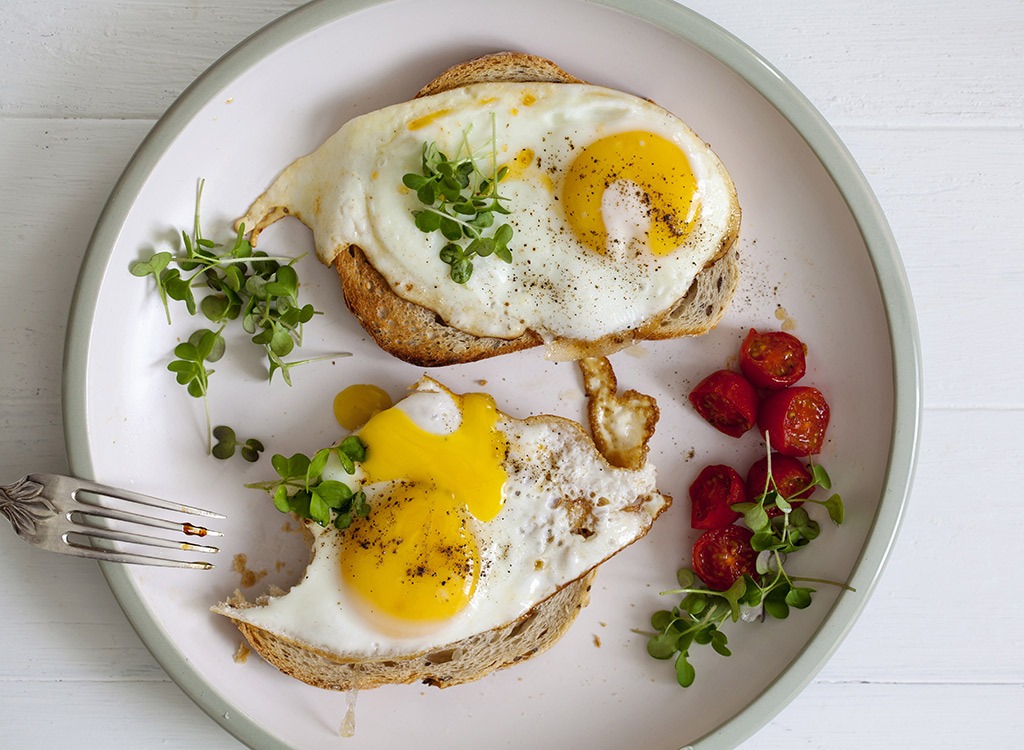
Eggs may rule the breakfast table, but they’re good for much more than just a quick scramble. With about 70 calories and six grams of protein per egg, they make for a healthy, low-cal addition to any meal. Eggs are also one of the few natural sources of vitamin D, which helps strengthen bones, boost immunity, fight depression and also speed up weight loss. Think beyond sandwiches and scrambles, though; some vitamins in veggies need to be paired with a fat to be absorbed by your body, and an egg serves that purpose perfectly while adding an extra punch of protein. Try topping a salad with a soft-boiled egg for a weekend sit-down lunch.
Bananas
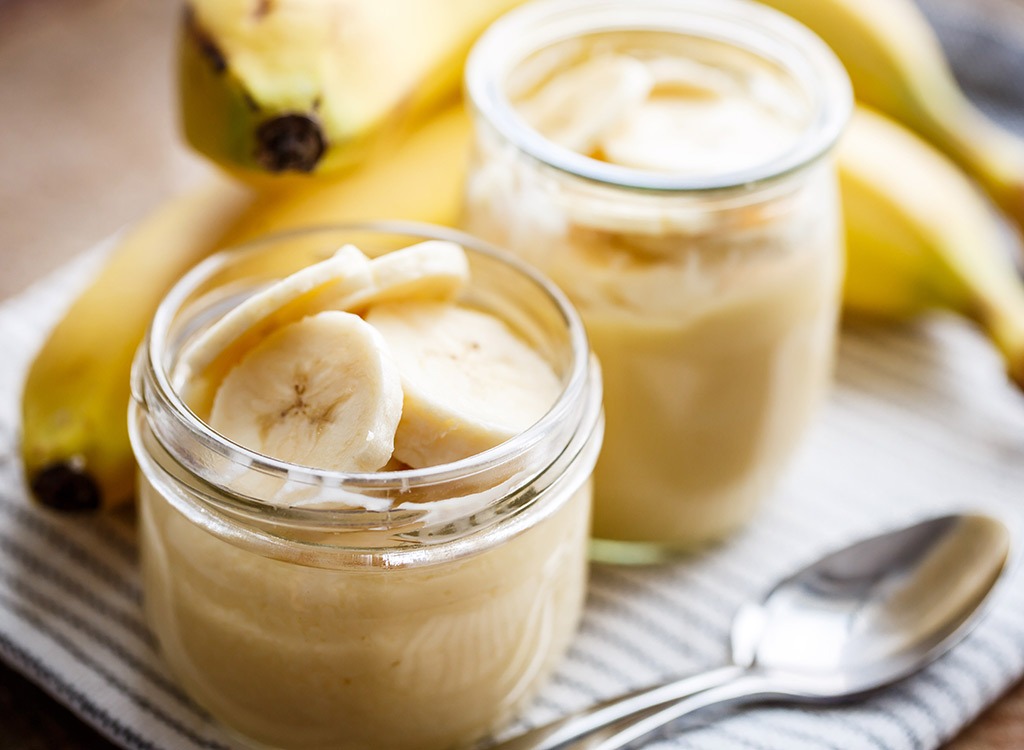
Sometimes fruit can get a bad rap from the weight-loss world for its sugar content, but let us clear the air: fresh fruit is always a healthy choice. A medium-sized banana is only about 100 calories and bursting with all kinds of B vitamins, which help your body convert food into energy.
They’re also a good source of insoluble fiber, which helps keeps you regular and, as a result, reduces bloating. In fact, a study found that women who ate a banana twice daily before meals for two months reduced belly bloat by 50 percent. Still worried about the sugar? Buy and use bananas when they’re still a touch green. Before they fully ripen, the fruits are rich in resistant starch, a hard-to-get form of fiber that digests slowly for prolonged feelings of fullness and more efficient fat oxidation.
Sweet Potatoes
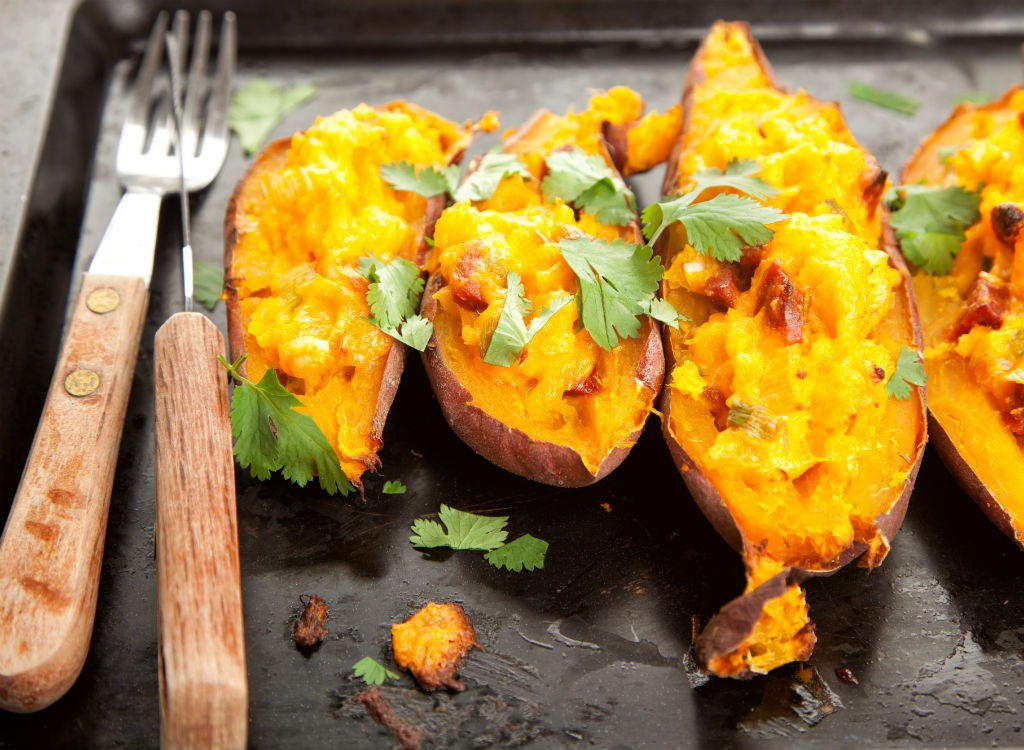
Sweet and slimming don’t often go together, but when they do, it’s a blessing from Mother Nature. Sweet potatoes fit the bill. A medium-sized spud (with the skin) packs around 100 calories and five grams of belly-filling fiber to keep you full and focused hours after your meal. They’re also low on the glycemic index, so eating these can help keep your blood sugar steady and unhealthy cravings at bay. Cook some extra spuds at dinner and use the leftovers to create an easy salad to eat in your office. You’ll bypass the vending machine, break room donuts and office candy bowl with ease.
Berries
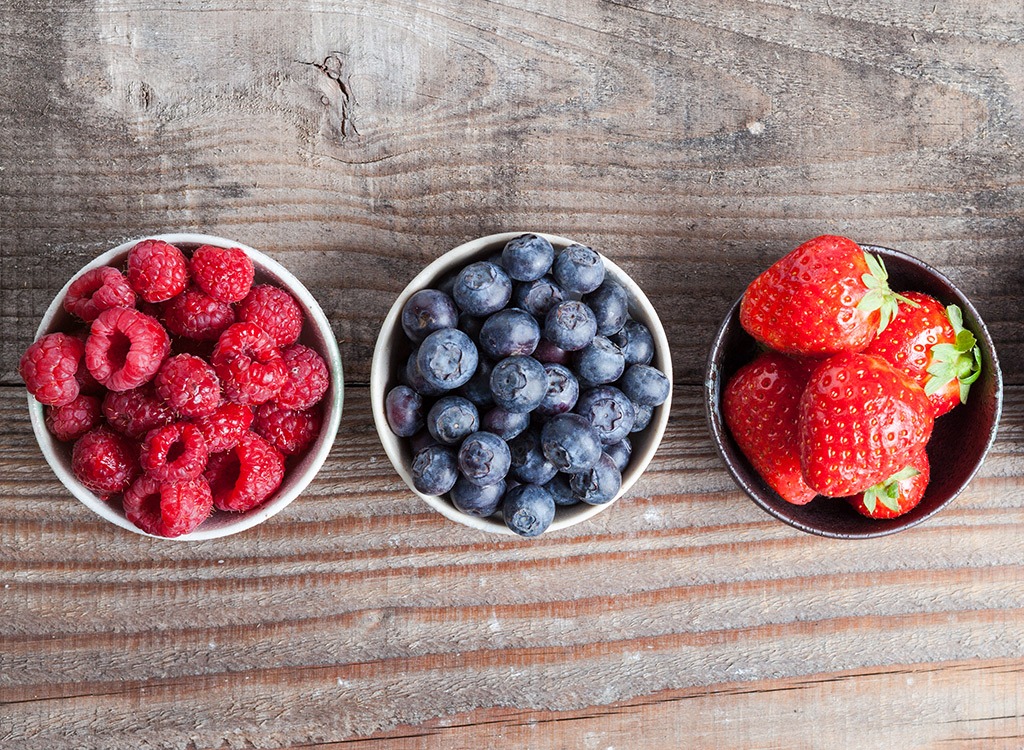
Berries—raspberries, strawberries, blueberries—are packed with polyphenols, powerful natural chemicals that can help you lose weight–and even stop fat from forming! In a recent Texas Woman’s University study, researchers found that feeding mice three daily servings of berries, decreased the formation of fat cells by up to 73 percent! A University of Michigan study showed similar results. Rats who had blueberry powder mixed into their meals had less abdominal fat at the end of the 90-day study than rats on a berry-free diet.
Cinnamon
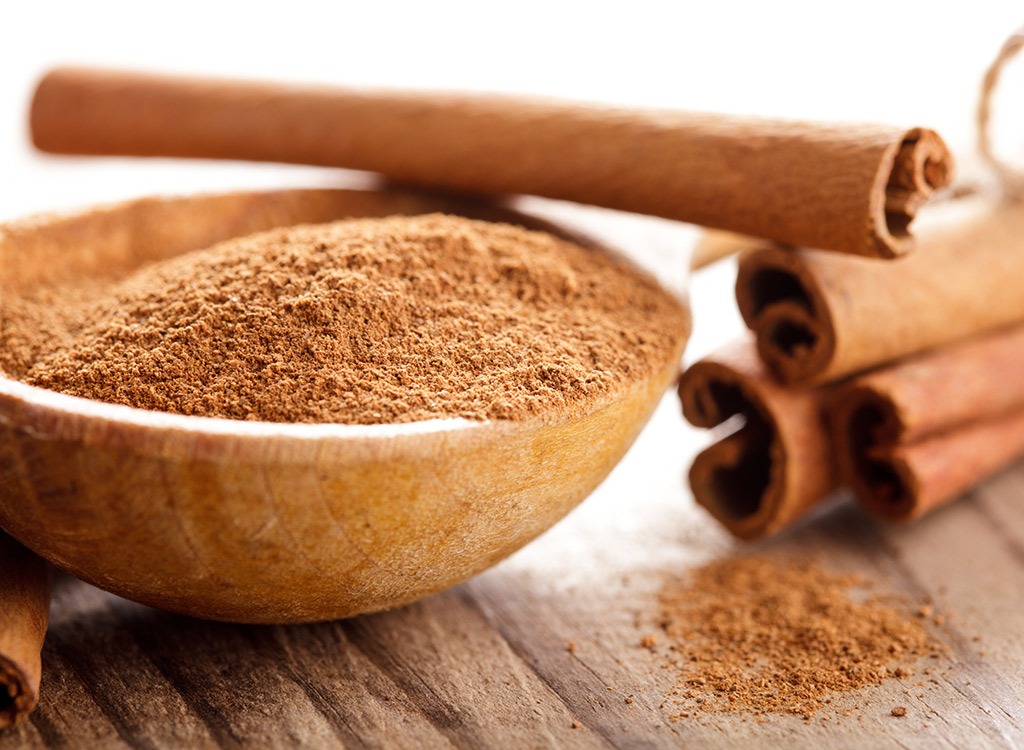
One of the best spices for weight loss, cinnamon also contains those magical polyphenols, which have been proven to slim bloated bodies and improve insulin sensitivity. A study published in Archives of Biochemistry and Biophysics showed that the consumption of cinnamon led to reduced belly fat in animals. And a series of studies printed in the American Journal of Clinical Nutrition found that adding a teaspoon of cinnamon to a carb-heavy meal could help stabilize blood sugar, preventing munchie-inducing insulin spikes.
Coconut Oil

This is one trend worth latching on to. Because of its neutral flavor, coconut oil is an ideal mix-in for just about any smoothie you can think of—and if you’re interested in torching belly fat, you’ll start brainstorming. Consuming coconut oil reduces abdominal obesity, a study printed in the journal Lipids found. Half of the study participants ate two tablespoons of coconut oil daily; the other half of the group was given soybean oil. Only the coconut-oil group saw their waistlines shrink.
Cayenne
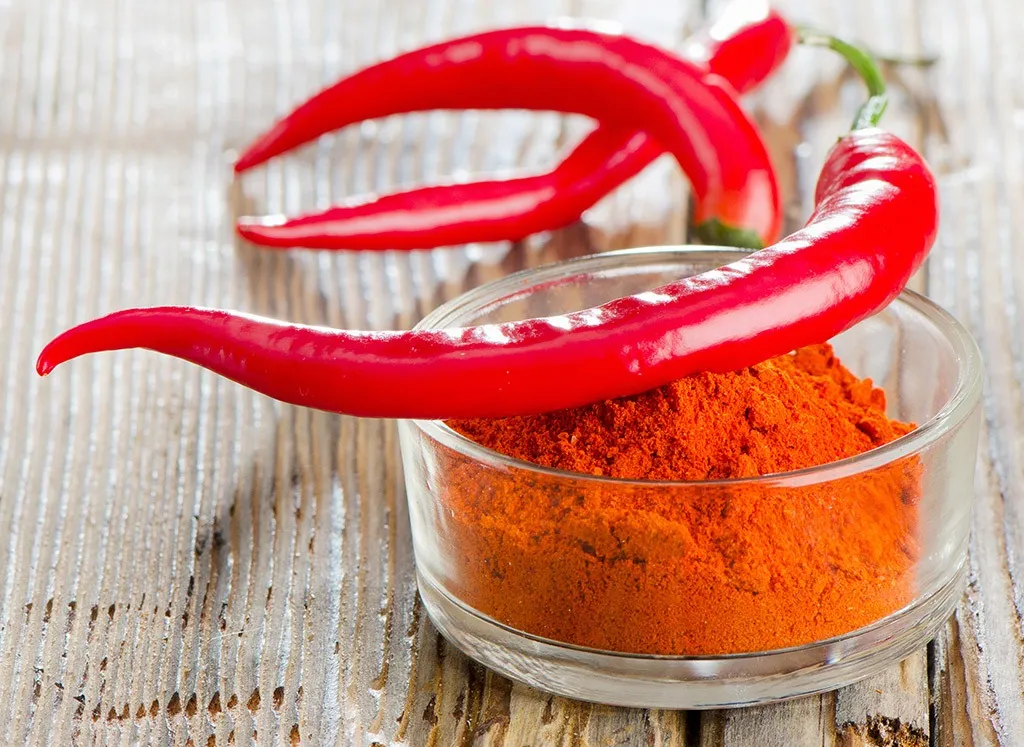
Capsaicin, the natural compound that gives chili peppers that beautiful burn, has been proven to reduce belly fat, suppress appetite and kickstart the body’s ability to burn food as energy. Daily consumption of capsaicin improved belly-fat loss, a study published in the American Journal of Clinical Nutrition found.
Plant-based Protein Powder
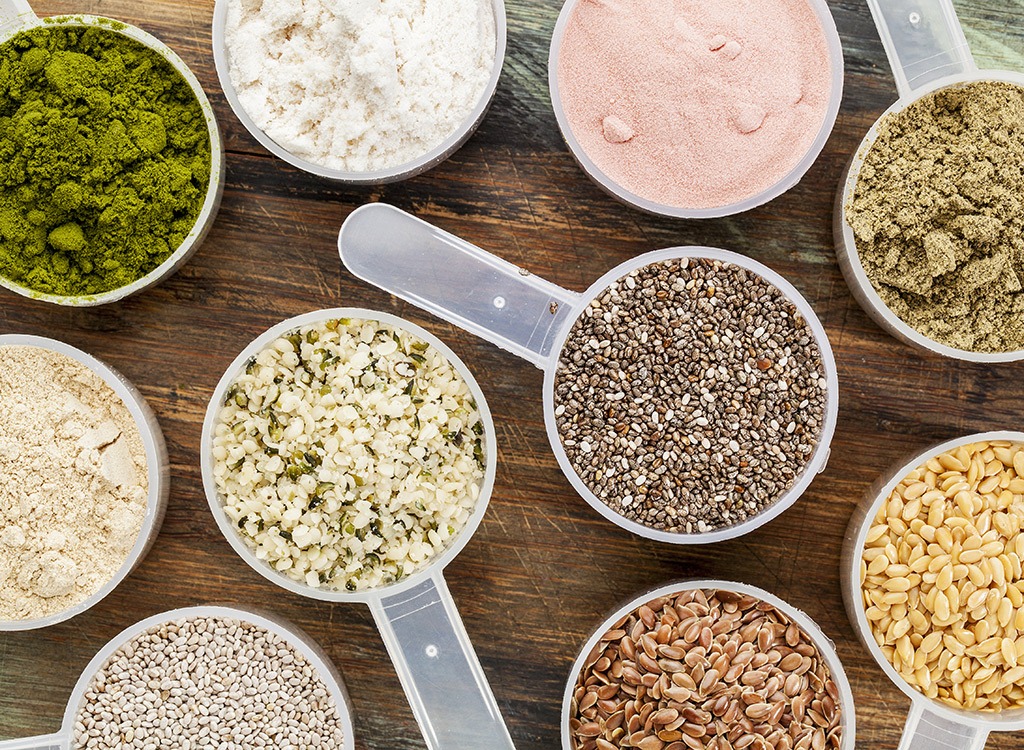
Supplementing your smoothie with protein powder is excellent for satiety, not to mention supporting the lean muscle that enables you to burn more fat. You’re best off with plant-based protein; whey, casein and other dairy-based powders can cause bloating. Look for a product that has no artificial colors, sweeteners or flavors. We like Vega One, Sunwarrior and Garden of Life.
Chia Seeds

Not only are chia seeds packed with fiber and protein, helping to keep you feeling full and satisfied – they also absorb toxins from your digestive tract. Though you can add a tablespoon of chia seeds directly into your blender, you’ll get more goodness out of them — and add to the smoothness of your smoothie — by combining them with water so that they form a gel. Combine equal parts chia seeds and water in a container. It will keep in the fridge for a few weeks, so you can experiment with how much to add to your shakes.
Oats
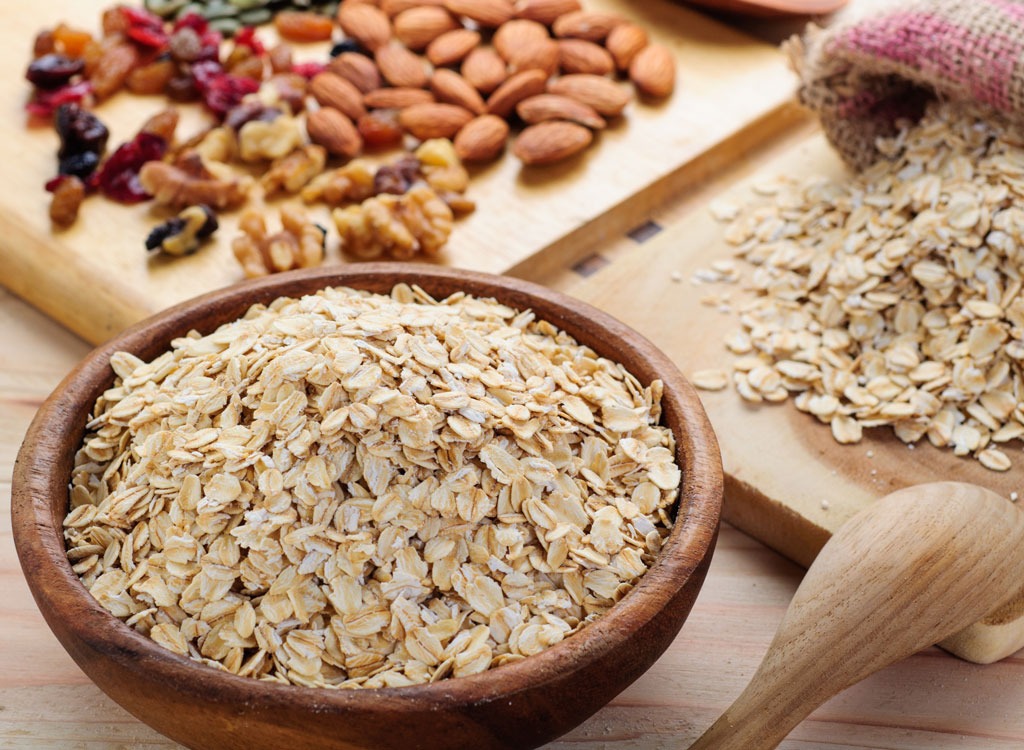
Oats are a tasty source of dietary fiber. High-fiber diets are more satiating, and have been linked to lower body weight. But that’s not the only reason oats deserve a spot in your weight-loss shakes: Beta glucans, part of the soluble fiber in oats, have been shown to lower total blood cholesterol and low-density lipoprotein (LDL) levels — meaning they can reduce your risk of heart disease.
Rooibos Tea
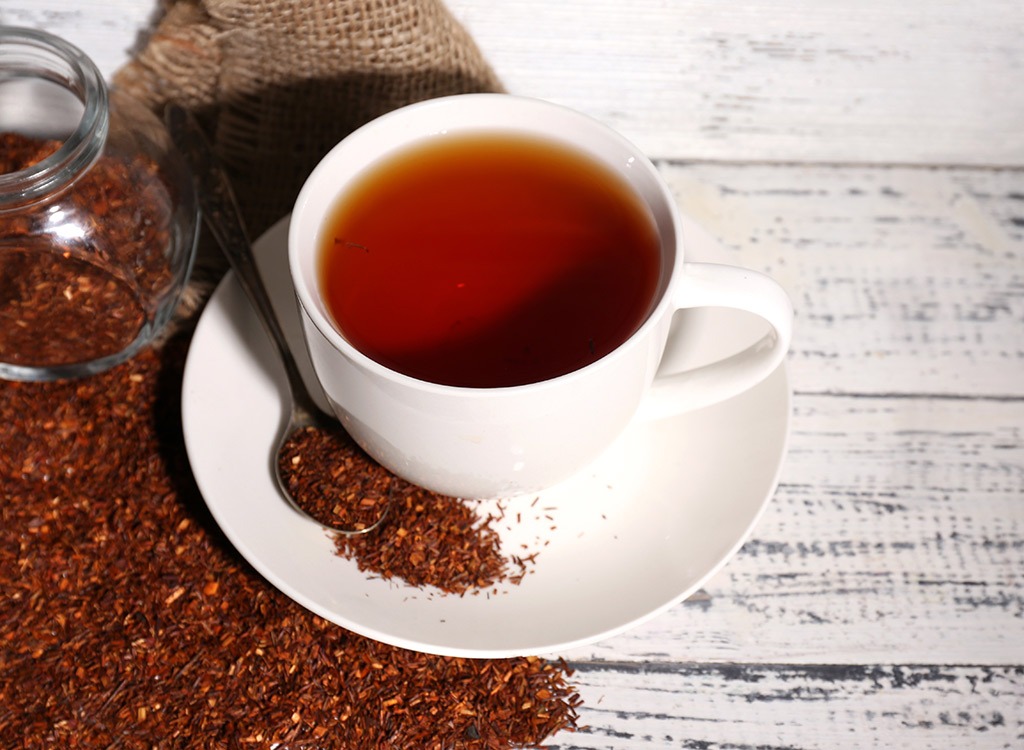
This red, naturally sweet tea made from the leaves of the Rooibos bush are powerful fat-melters. According to South African researchers, polyphenols and flavonoids found in the plant inhibits adipogenesis–the formation of new fat cells–by as much as 22 percent. The chemicals also help aid fat metabolism. Sip this brew to help burn that stubborn bit of chub clinging to your middle. Speaking of whittling your middle, reveal the washboard stomach you’ve been wishing for with these 11 Eating Habits That Will Uncover Your Abs.
Ruby Red Grapefruit
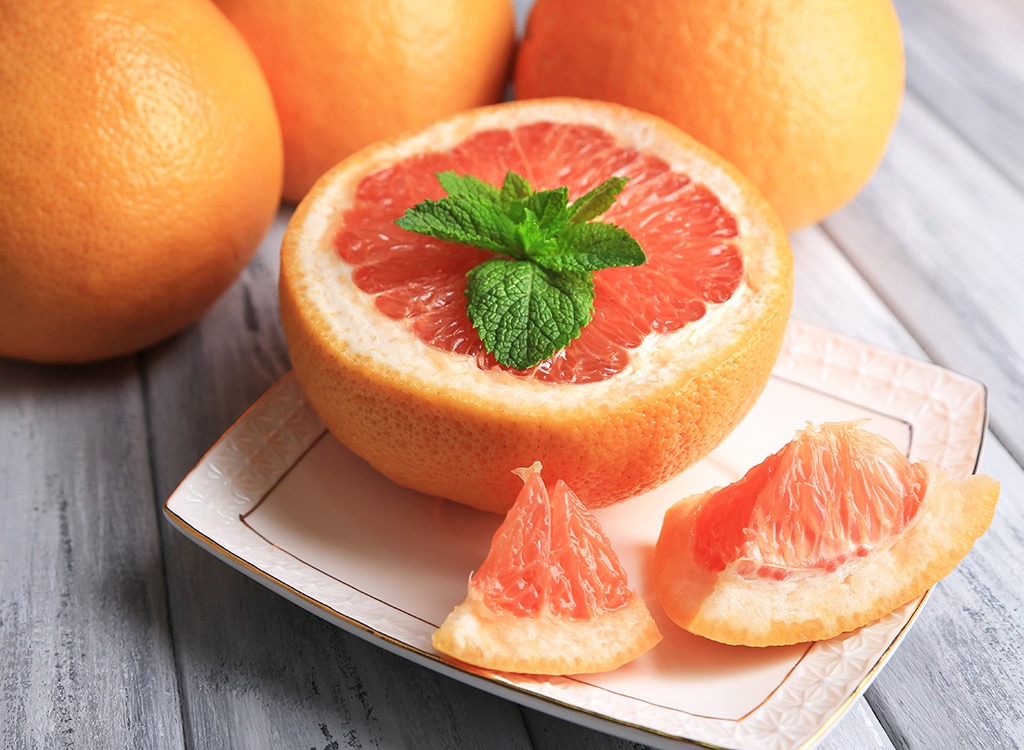
A study printed in the journal Metabolism found the eating half a grapefruit before meals may help reduce visceral (belly) fat and lower cholesterol levels. Participants of the six-week study who ate grapefruit with every meal saw their waists shrink by up to an inch! Researchers attribute the effects to a combination of phytochemicals and vitamin C in the grapefruit. Consider having half of a grapefruit before your morning oatmeal, and slicing a few segments to a starter salad.
Pink Lady Apples
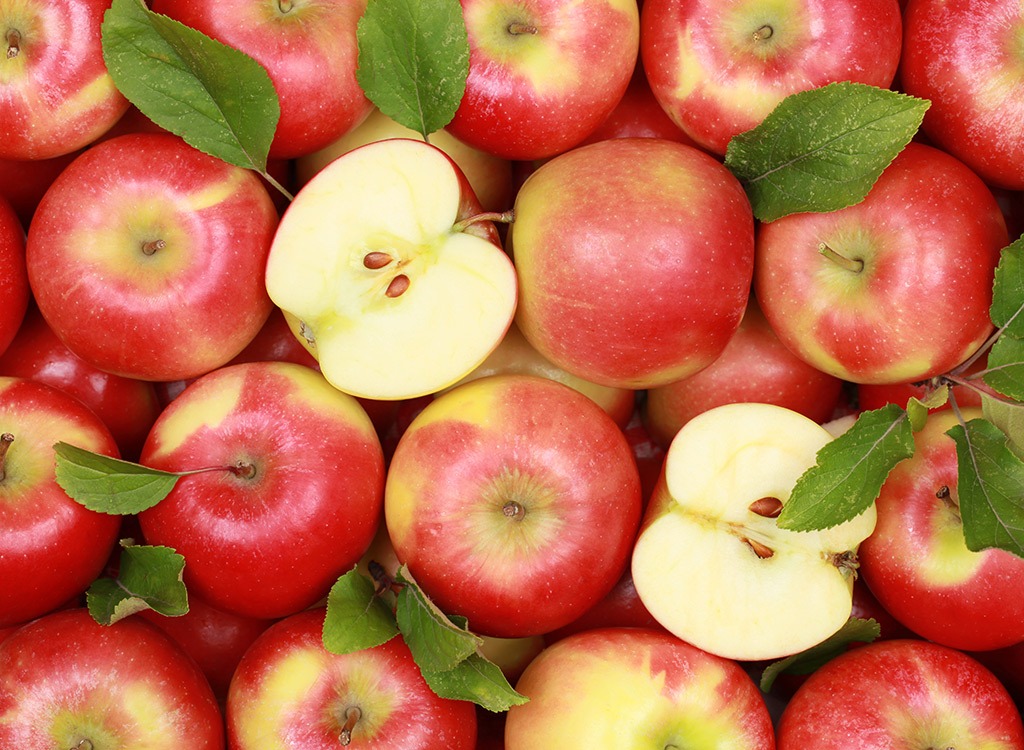
Apples are one of the very best fruit-sources of fiber, which studies have proven to be integral to reducing visceral fat. A recent study at Wake Forest Baptist Medical Center found that for every 10-gram increase in soluble fiber eaten per day, visceral fat was reduced by 3.7 percent over five years. Additionally, increased moderate activity (30 of sweating, 2-4 times a week) resulted in a 7.4 percent decrease in the rate of visceral fat accumulation over the same time period. A study conducted at the University of Western Australia found that the Pink Lady variety had the highest level of antioxidant flavonoids.
White Tea
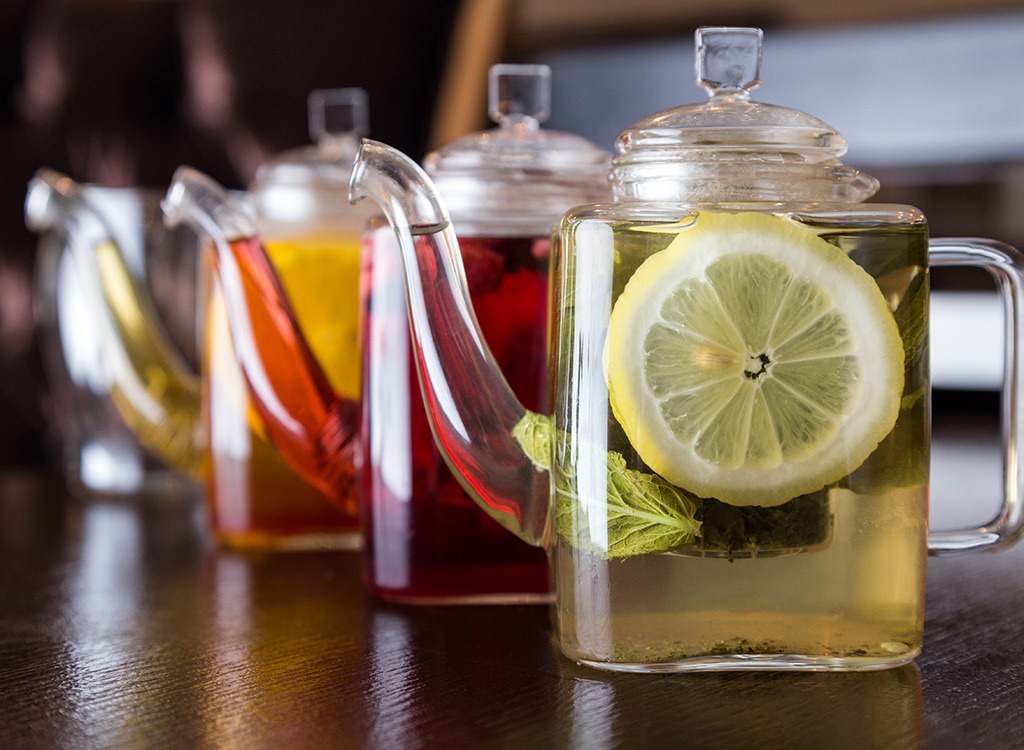
We love white tea because it works in four ways to help you shed that pesky flab. According to a study published in the journal Nutrition and Metabolism, this brew blocks the formation of new fat cells while simultaneously boosting lipolysis, the body’s process of breaking down stored fats. Another group of researchers found that the tea is also a rich source of catechins, a type of antioxidant that triggers the release of fat from the cells and helps speed the liver’s ability to turn fat into energy. Who needs Spanx when you can just sip on this powerful brew? Speed up your slim down when you alternate sipping cups of white tea and these 5 Best Teas for Weight Loss.
Stone Fruits
New studies by Texas AgriLife Research suggest peaches, plums and nectarines may help ward off metabolic syndrome — a name for a group of risk factors, of which belly fat is a predominant determinant, that increase the risk for obesity-related diseases including diabetes. The belly-good properties of stone fruits come from powerful phenolic compounds that can modulate fat-gene expression. Better yet, fruits with pits are among the lowest in fructose or fruit sugar.
Legumes

Lentils, chickpeas, peas and beans — they’re all magic bullets for belly-fat loss. In one four-week Spanish study, researchers found that eating a calorie-restricted diet that includes four weekly servings of legumes aids weight loss more effectively than an equivalent diet that doesn’t include them. Those who consumed the legume-rich diet also saw improvements in their “bad” LDL cholesterol levels and systolic blood pressure. To reap the benefits at home, work them into your diet throughout the week. Salad is an easy way. Toss them up with more of the Best Salad Ingredients for Weight Loss!
Chocolate Milk
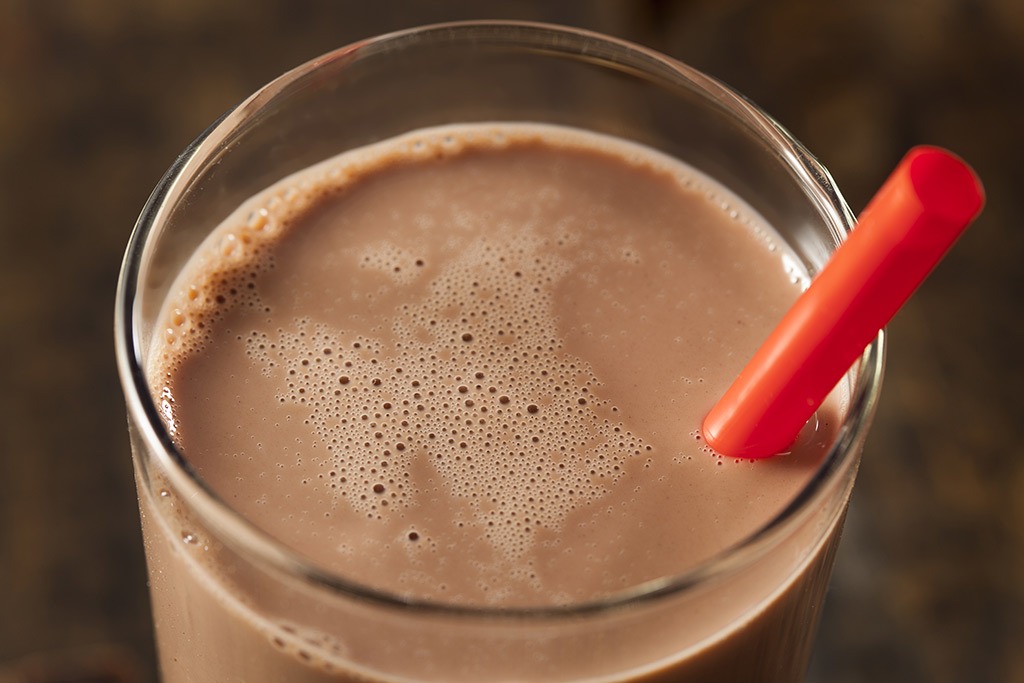
Want to know the secret to staying slim? You need more muscle. That’s because muscle burns more calories than fat, so for every new muscle fiber you create, your resting metabolism receives another surge of fat-torching energy. And chocolate milk can help you do that. Researchers have determined that the ideal protein load for building muscle is 10 to 20 grams, half before and half after your workout. How much protein will you find in low-fat chocolate milk? Eight grams per cup. (That means one serving before your workout and one serving after will give you a total of 16 grams of highly effective whey protein—a perfect serving.) Add that to the extra cup you drank first thing in the morning and you’re looking at a turbocharged metabolism that keeps you burning calories all day long. (Pair your chocolate milk habit with these 6 Ways to Boost Your Metabolism to double down on the slimming effects.)
Grass-fed Beef
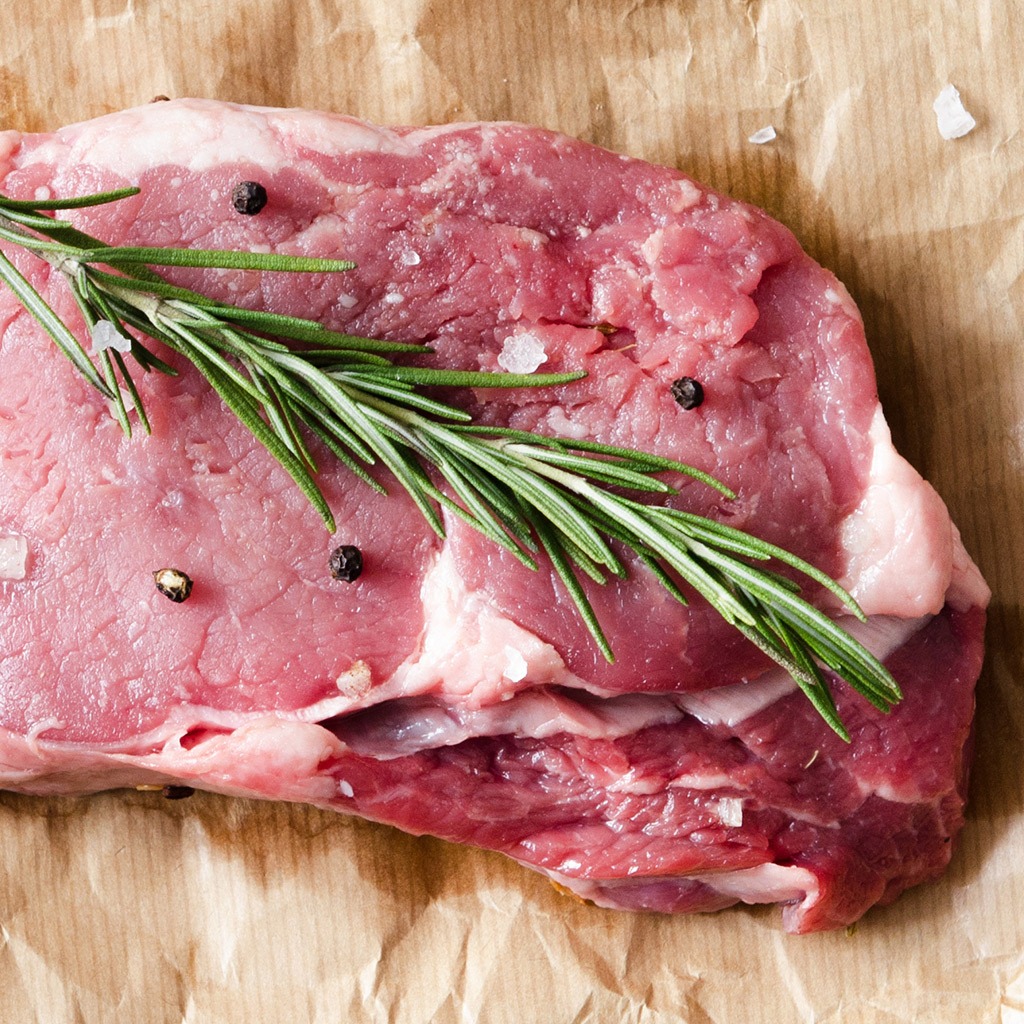
When it comes to steak or burgers, go grass-fed. It may ding your wallet, but it’ll dent your abs. Grass-fed beef is naturally leaner and has fewer calories than conventional meat: A lean seven-ounce conventional strip steak has 386 calories and 16 grams of fat. But a seven-ounce grass-fed strip steak has only 234 calories and five grams of fat. Grass-fed meat also contains higher levels of omega-3 fatty acids, according to a study published in Nutrition Journal, which have been shown to reduce the risk of heart disease.
Matcha
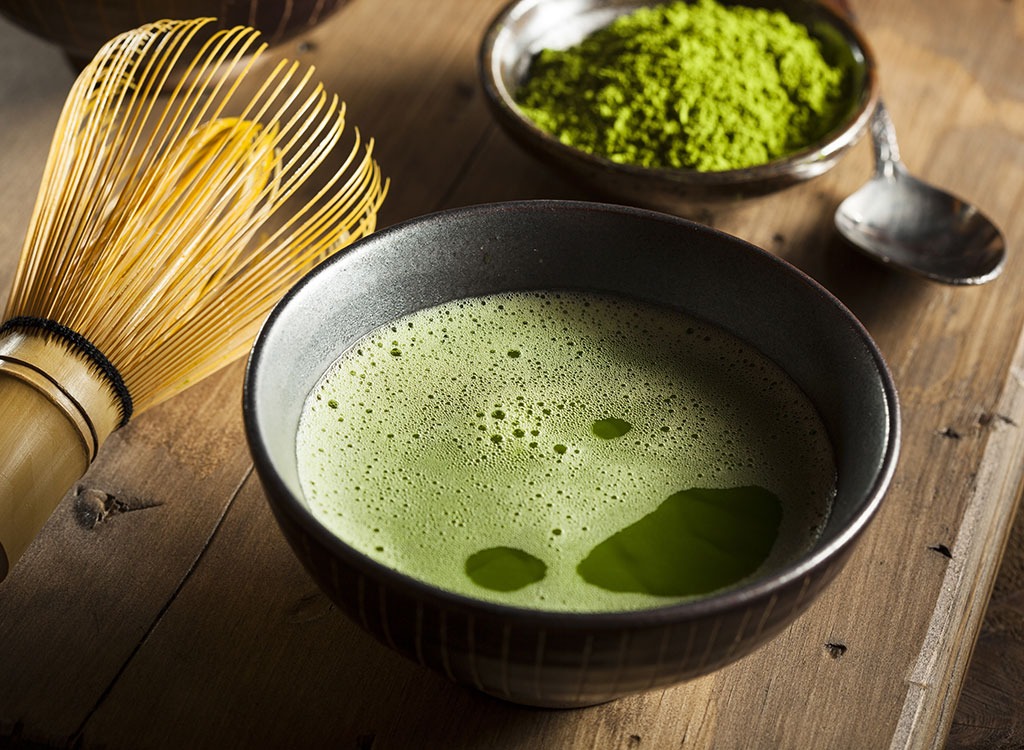
Matcha is a form of green tea that uses the entire leaf in powdered form, rather than flakes of leaves. Some studies have shown the concentration of EGCG in matcha to be as much as 137 times greater than what you’ll find in store-bought tea bags. One study found men who drank green tea containing 136 mg of EGCG—what you’ll find in a single 4-gram serving of matcha—lost twice as much weight and four times as much belly fat over 3 months than a placebo group. Try it in these 8 Fat-Blasting Recipes Using Matcha!
Halibut
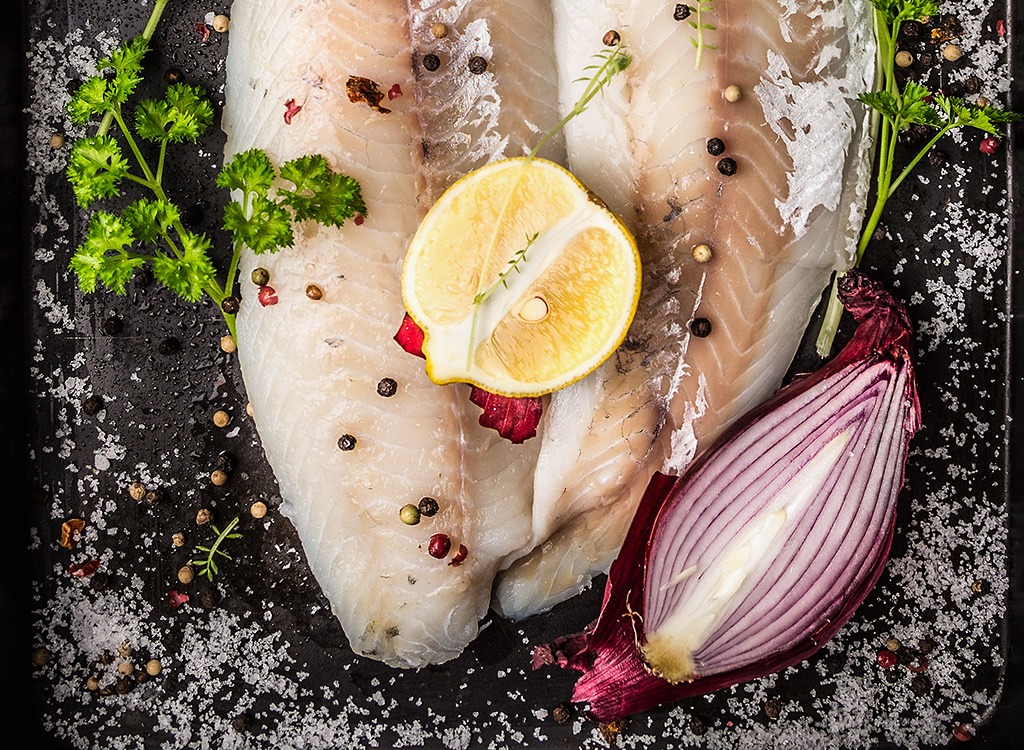
You already knew fish was rich in protein but you might be surprised to learn that halibut tops fiber-rich oatmeal and vegetables in the satiety department. The Satiety Index of Common Foods, an Australian study published in the European Journal of Clinical Nutrition, ranks it the number two most filling food—bested only by boiled potatoes for its fullness factor. A separate Australian study that compared the satiety of different animal proteins found a nutritionally similar white fish (flake) to be significantly more satiating than beef and chicken; satiety following the white-fish meal also declined at a much slower rate. Study authors attribute the filling factor of white fish like halibut to its impressive protein content and influence on serotonin, one of the key hormones responsible for appetite signals. Just make sure you avoid tilapia.
Avocado
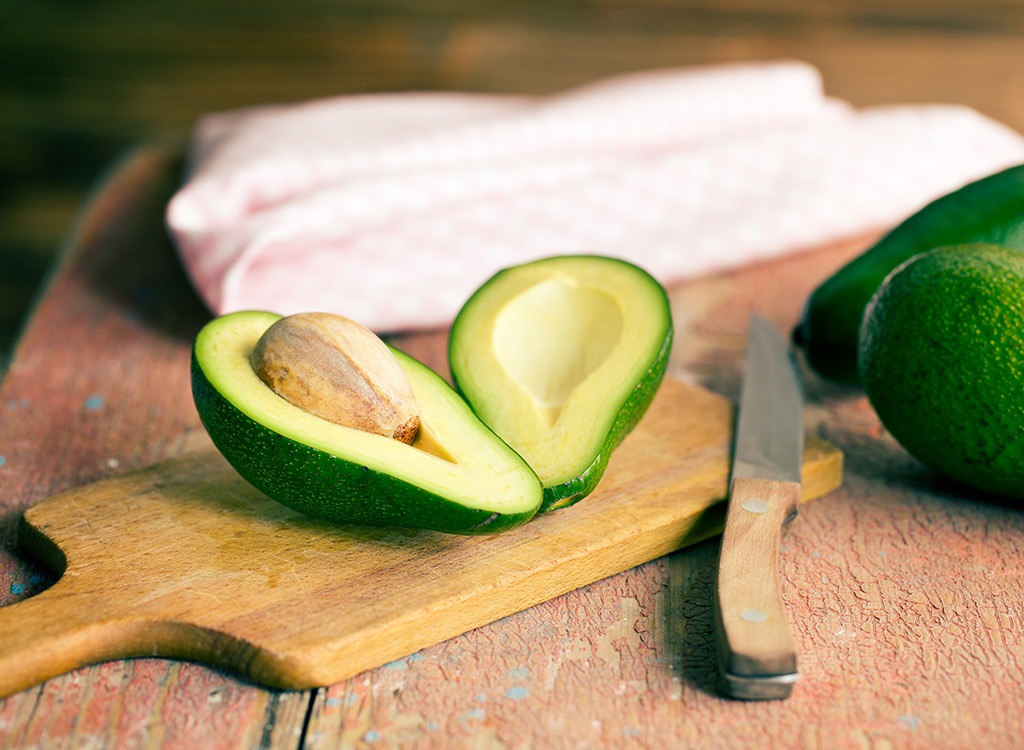
All those pictures of avocado on Instagram aren’t purely for show. Avocados are a flat-belly food by every trainer’s or nutritionist’s standard. The healthy monounsaturated fats and oleic fatty acids found in avocados squash hunger and help your body better absorb nutrients from veggies when paired together. That means topping your salad and fajita veggies with this fruit actually makes your meal healthier. On average, one avocado contains around 300 calories, so stick to one-quarter to one half for one serving.
